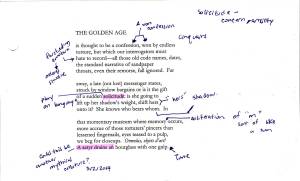When I first read this poem, the first thing I wrote on the top was “a won confession” The poem starts out with the comparative allegory of The Golden age as a confession, something built up to open out. So then the question becomes, “by endless torture, but which our interrogators must / hat to record.” Does a golden age happen without being chronicled? “all those old code names, dates, / the standard narrative of sandpaper / throats even their remorse, fall ignored.” This sequence goes from chronology to interpretation to emotion. By creating the sequence this way, the poem opens up to more than just a commentary on a time frame.
The shift then occurs with a more personal scene with:
[…]Far
away, a late (not lost) messenger stares,
struck by window bargains or is it the gift
of a sudden solicitude:
Here, there is the either/or condition. The beginning gambit is the initial onset of window bargains; however, upon closer inspection there’s self awareness of “concern, anxiety” (which the speaker plays on language here). And from this self recognition, the messenger goes further in, “is she going to / lift up her shadow’s weight, shift hers / onto it?” These lines are forcing the metaphor not only from the speaker’s point of view, but also the subjects. This is the start where I lose focus just because I was mostly interested in the play of surreal play in the first stanza.
I think it’s the start of the third stanza where I lose some interest in the poem, “that momentary museum where memory occurs, / more accrues of those torturer’s pincers” It’s the alliteration that forces the language and the poem, just as the previous stanza with forced shadow metaphor. I think this poem would’ve been stronger without the second stanza and then the focus is on the “fall” rather than focusing on the character of the messenger or the alliteration. In this way there is a focus on the reader’s voyeurism versus reader’s interpretation, “lessened fingernails, eyes teased to a pulp, / we beg for closeups.”
“Ormolus, objets d’art!” I don’t know what this means? Should I? I feel the last image is strong though, “A satyr drains an hourglass with one gulp.” Even though this image is a bit out there, I feel this image fits more with the way the first and third stanzas are structured a real intense surreal play and then something lighthearted as a break which refers back to time in some way.
